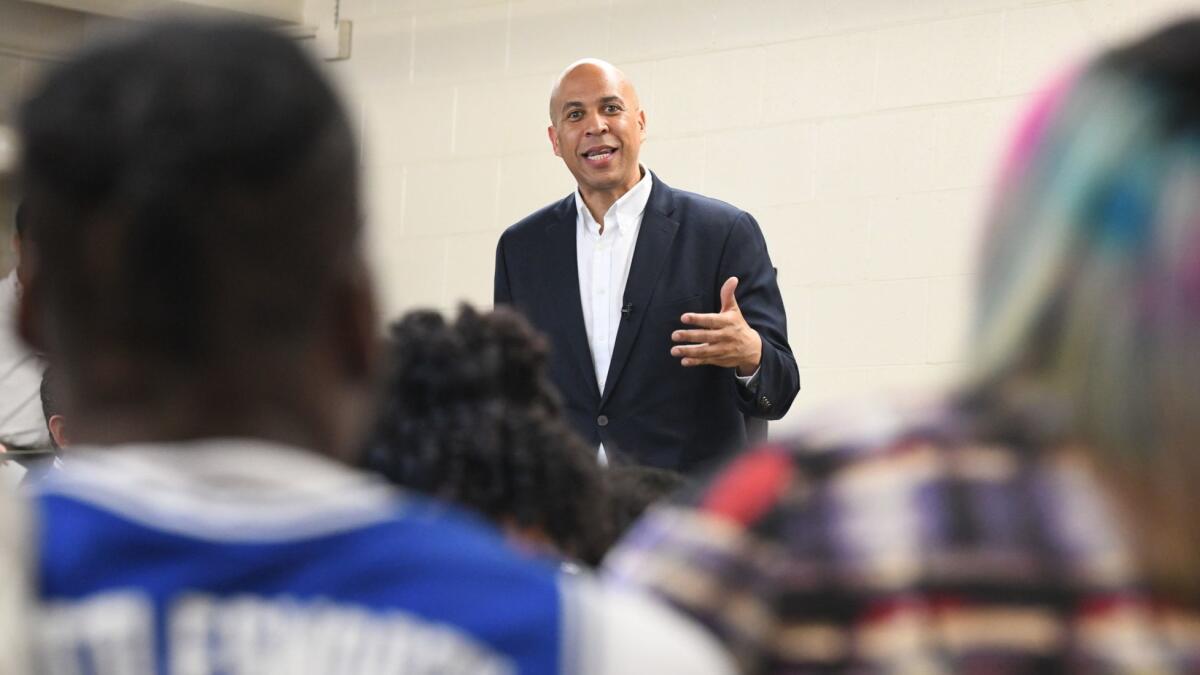Column: Cory Booker takes a risk on gun control — and it may pay off in campaign

- Share via
Reporting from Washington — Sen. Cory Booker of New Jersey, one of the 21 Democrats running for president, has pitched an ambitious new proposal for gun control — and he deserves credit for its boldness. Booker says every gun owner should be required to apply for a federal license, a process that would include not only a background check, but also safety training and an interview.
Booker has struggled to stand out in a crowded field. He launched his campaign in February with an appeal for “universal love,” but Democrats made clear they want a fighter, not a lover. He offered novel ideas on criminal justice reform and “baby bonds” for low-income families, but those didn’t catch on either.
Now, with gun control, he may have found an idea he can make his own.
It’s an issue that connects to Booker’s powerful biography as a son of Newark, one of the country’s toughest cities. “I can’t stay away from this,” he said on Monday. “This is not some policy issue out there. [Gun violence] is an everyday experience to people like me.”
A decade ago, major Democratic candidates avoided talking up gun control for fear of losing rural voters. Nominees even arranged to be photographed on hunting trips to prove that they knew how to carry a shotgun.
But most rural voters look out of reach these days. The Democratic voter base is almost entirely urban and suburban — and increasingly passionate about gun control after years of gruesome shootings at schools, churches, synagogues and more.
In 2014, a Gallup poll found that 71% of Democrats favored tougher gun laws; by 2018, that number had swelled to 87%. Among all Americans, it’s 61%. Among Republicans, it’s 31%. Gun laws are a polarizing issue.
Kamala Harris and Cory Booker embrace new era for black candidates post-Obama »
So for a Democrat seeking a foothold in the scramble for the nomination, Booker’s proposal makes sense.
Beyond the politics, it looks like good policy too.
Research shows that gun licensing, which is already required in nine states, is strikingly effective in reducing gun homicides and suicides — far more than universal background checks, the generic Democratic proposal.
The most famous case is Connecticut, where a 1995 law requires residents to obtain a state-issued permit to buy handguns. Researchers from Johns Hopkins University and UC San Francisco estimated that the law reduced gun homicides by 40% and handgun suicides by 15%. (They completed their study before the 2012 Sandy Hook Elementary School massacre in Newtown, Conn.)
Some of the same researchers also looked at a state that went in the opposite direction: Missouri, which had a gun permit law but repealed it in 2007. After the license requirement was eliminated, firearm homicides increased 23% and handgun suicides increased 16%.
More familiar gun control measures —including background checks and assault weapons bans — don’t produce results as dramatic.
To many gun owners, Booker’s proposal for federally issued gun permits will undoubtedly sound cumbersome, costly and unconstitutional. The senator says it’s not.
Not surprisingly, the National Rifle Assn. immediately attacked his plan, inaccurately, as a “ban [on] all guns” because it prohibits the sale of assault weapons and warned that “millions” of law-abiding gun owners would be imprisoned if the law was passed.
Gun owners have little to fear, at least in the short run. Booker is still a long shot for the nomination and a long way from becoming president. Even if he reaches the White House, the chances that a gun-licensing bill will pass the Senate, where rural states hold disproportionate power, is negligible.
But Booker’s proposal widens a gun control debate that had grown narrow and stale; that’s a good thing. And it’s one of many examples of how the overcrowded Democratic race has turned into a roiling marketplace of policy ideas.
Take Booker’s “baby bonds,” a proposal to give every newborn a federal savings account of $1,000 and add as much as $2,000 per year for children in low-income households. It’s a race-neutral proposal that would go a long way toward closing the wealth gap between black and white families.
Who’s running for president and who’s not »
California Sen. Kamala Harris has proposed tax credits for low-income working people, another tax credit for tenants burdened by high rent and a proposal to raise teachers’ salaries by $13,500 a year. These are all ideas worth exploring.
So is Massachusetts Sen. Elizabeth Warren’s proposal for a wealth tax, a levy of 2% on fortunes worth more than $50 million. Experts warn that the tax would be difficult to collect because the rich can move assets offshore — but at least Warren has made it easy to remember, dubbing it “2 cents on the dollar.”
And of course there’s “Medicare for all,” the universal health insurance plan first proposed by Sen. Bernie Sanders of Vermont but now available in nearly as many flavors as Ben & Jerry’s ice cream.
Too much of the conversation heading into the primaries has focused on polls and electability. Who’s the front-runner? It doesn’t matter at this point because front-runners often stumble or fade. Who’s most electable? That’s a riddle no one can answer until ballots are counted.
The primary of ideas, on the other hand, has been creative and intriguing. Booker and his rivals have broadened the possibilities beyond the narrow range of Washington’s arid last decade of gridlock-constrained debate.
Democratic candidates: You still have seven weeks before the first debates to make a mark. More ideas, please.
More to Read
Get the L.A. Times Politics newsletter
Deeply reported insights into legislation, politics and policy from Sacramento, Washington and beyond. In your inbox twice per week.
You may occasionally receive promotional content from the Los Angeles Times.











